香港大律师公会专业守则
当代中国政治制度 简答题

简答题目录1.1.制度及政治制度的含义。
1.2.为什么说在社会各项制度中,经济制度起根本的决定作用?1.3.简述思想文化制度对政治制度的作用。
1.4.简述当代中国社会主义政治制度的主要内容。
1.5.政治体制改革总的目标是什么?1.6 简述政治制度的特征2.1.在社会主义建设时期,中国政治制度可分为哪几个发展时期?2.2.简述1956—1966年,中国政治制度发展的主要特点。
2.3.简述“文化大革命”中,中国政治制度发展的主要特点。
2.4.近代中国的社会阶级状况和阶级关系有哪些显著特点?2.5.简述毛泽东关于人民民主专政思想的主要论述。
3.1.政体分为哪几种?主要从哪些方面区分?3.2.什么是国家结构形式,它分哪几种?3.3.简述国家行政机关及其主要职能。
3.4.如何认识中国国家军事机关?3.5 简述中国采用单一制国家结构形式的原因3.6简述中国单一制结构形式的复杂性。
3.7 简述议行合一原则。
4.1.简述当代中国选举制度的发展过程。
4.2.怎样理解选举权和被选举权的普遍原则?4.3.简述选民要成为县级人大代表必须遵循的主要选举程序。
4.4.简述我国选举法关于选区划分的有关规定。
4.5.简述选民登记的主要工作。
4.6.主持间接选举的机构有哪些?4.7.简述各级人民代表大会闭会期间人大代表的职权。
4.8.怎样认识人大代表的地位?4.9.《代表法》为什么要规定人大代表执行职务的保障?4.10.简述人大代表必须履行的义务。
4.11 简述直接选举的程序。
4.12简述选举文员会确定代表候选人名单后,如何向选民介绍代表候选人情况。
4.13简述秘密投票的原则。
4.14结合邓小平的有关论述说明我国实现直接选举是个逐步实现的过程。
4.15人大代表履行代表职权时有哪些主要保障?4.16简述各级人民代表大会开会期间人大代表的职权。
4.17简述社会主义选举制度与资本主义选举制度的主要区别。
5.1.简述召开全国人民代表大会的基本程序。
香港的则师注册制度
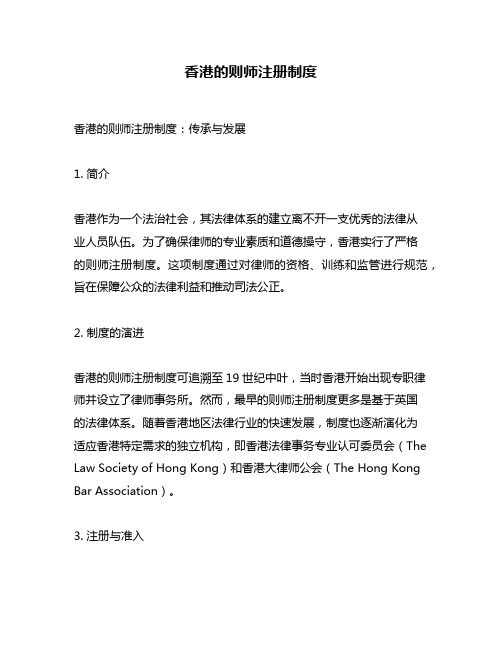
香港的则师注册制度香港的则师注册制度:传承与发展1. 简介香港作为一个法治社会,其法律体系的建立离不开一支优秀的法律从业人员队伍。
为了确保律师的专业素质和道德操守,香港实行了严格的则师注册制度。
这项制度通过对律师的资格、训练和监管进行规范,旨在保障公众的法律利益和推动司法公正。
2. 制度的演进香港的则师注册制度可追溯至19世纪中叶,当时香港开始出现专职律师并设立了律师事务所。
然而,最早的则师注册制度更多是基于英国的法律体系。
随着香港地区法律行业的快速发展,制度也逐渐演化为适应香港特定需求的独立机构,即香港法律事务专业认可委员会(The Law Society of Hong Kong)和香港大律师公会(The Hong Kong Bar Association)。
3. 注册与准入按照则师注册制度,想要成为一名合格律师的人必须符合一系列要求。
他们需要通过则师资格考试,凭借学术与实践能力来证明其法学知识和技能。
申请人需要满足道德品质和适合从事法律职业的标准,包括无不良纪录和犯罪记录。
4. 培训与实习除了资格考试,注册制度还强调实践经验和继续专业培训的重要性。
律师需要在指定的专业律师事务所或机构进行实习职位,以增加实践经验并熟悉各种法律领域。
注册律师还需要参加每年的继续专业培训课程,以确保其专业知识与技能的不断更新。
5. 监管与纪律则师注册制度还设立了一个专门的监管机构——香港律师事务监察部(The Hong Kong Legal Practitioners' Complaints Commissioner)。
这个机构负责处理公众对律师的投诉,并监督律师遵守职业道德和执业规则。
对于违反纪律的律师,有关机构有权采取纪律处分措施,包括警告、罚款甚至撤销资格。
6. 价值与意义香港的则师注册制度在保障公众法律利益和推动司法公正方面发挥着重要作用。
通过严格的资格考试和道德标准,该制度确保了律师的专业能力和诚信水平。
香港法例-第159章 法律执业者条例第159E章 大律师(资格)规则

章:159E 大律师(资格)规则宪报编号版本日期赋权条文 30/06/1997(第159章第72及72A条)[1973年1月19日](本为1973年第9号法律公告)条: 1 引称 30/06/1997 本规则可引称为《大律师(资格)规则》。
条:1A 适用范围L.N. 92 of 2003 28/03/2003本规则适用于—(a) 根据经《2000年法律执业者(修订)条例》(2000年第42号)(“《修订条例》”)修订的本条例第74C条,选择根据本条例第27条(按该条紧接在被《修订条例》废除前的规定)获认许的人;或(b) 谋求根据经《修订条例》修订的本条例第74D条获认许的人。
(2003年第9号法律公告)条: 2 1986年6月1日前的全面认许:实际执业的资格检定期L.N. 178 of 200801/01/2009(1) 凡任何人在1986年6月1日前根据本条例第27(1)(a)(i)或(ii)条获全面认许为大律师,则就本条例第31条而言,实际执业的资格检定期,须为该人在英格兰或北爱尔兰获认许为大律师或在苏格兰获认许为讼辩人的日期后,在英联邦的任何部分作为大律师或讼辩人的不少于12个月的实际执业期,或如任何人在英格兰或北爱尔兰获认许为大律师前或在苏格兰获认许为讼辩人前,已在英联邦的任何部分获认许为大律师或讼辩人,则实际执业的资格检定期,为该人获如此认许的日期后不少于12个月的实际执业期;上述实际执业期可包括以下期间─ (2008年第178号法律公告)(a) 如该人已取得由法律教育理事会*发出的证明书,证明他已圆满修毕该理事会的深造实习程#,则包括该课程的期间;(b) 在一名在英格兰或北爱尔兰的执业大律师或在苏格兰的讼辩人学院的执业会员的办事处任实习大律师的任何期间;(c) 在一名在香港的执业大律师的办事处任实习大律师的任何期间;(d) 在律政司任实习大律师的任何不超过9个月的期间,而该段期间可包括借调法律援助处的不超过3个月的期间。
香港大律师公会的提议简要
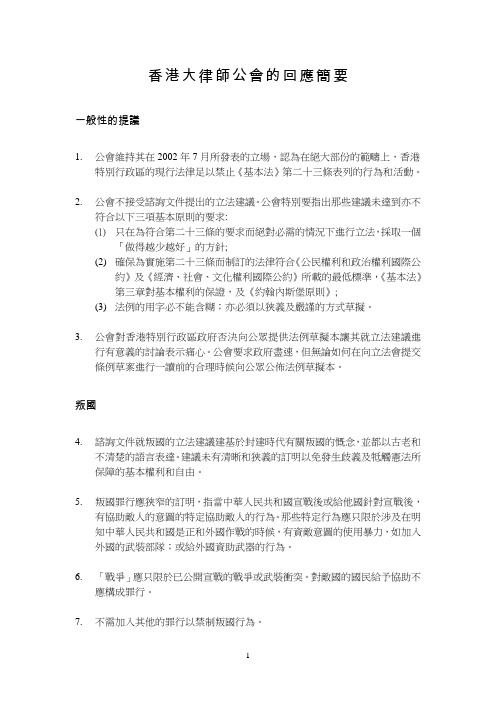
香港大律師公會的回應簡要一般性的提議1.公會維持其在2002年7月所發表的立場,認為在絕大部份的範疇上,香港特別行政區的現行法律足以禁止《基本法》第二十三條表列的行為和活動。
2.公會不接受諮詢文件提出的立法建議。
公會特別要指出那些建議未達到亦不符合以下三項基本原則的要求:(1)只在為符合第二十三條的要求而絕對必需的情況下進行立法,採取一個「做得越少越好」的方針;(2)確保為實施第二十三條而制訂的法律符合《公民權利和政治權利國際公約》及《經濟、社會、文化權利國際公約》所載的最低標準,《基本法》第三章對基本權利的保證,及《約翰內斯堡原則》;(3)法例的用字必不能含糊;亦必須以狹義及嚴謹的方式草擬。
3.公會對香港特別行政區政府否決向公眾提供法例草擬本讓其就立法建議進行有意義的討論表示痛心。
公會要求政府盡速,但無論如何在向立法會提交條例草案進行一讀前的合理時候向公眾公佈法例草擬本。
叛國4.諮詢文件就叛國的立法建議建基於封建時代有關叛國的慨念,並都以古老和不清楚的語言表達。
建議未有清晰和狹義的訂明以免發生歧義及牴觸憲法所保障的基本權利和自由。
5.叛國罪行應狹窄的訂明,指當中華人民共和國宣戰後或給他國針對宣戰後,有協助敵人的意圖的特定協助敵人的行為。
那些特定行為應只限於涉及在明知中華人民共和國是正和外國作戰的時候,有資敵意圖的使用暴力,如加入外國的武裝部隊;或給外國資助武器的行為。
6.「戰爭」應只限於已公開宣戰的戰爭或武裝衝突。
對敵國的國民給予協助不應構成罪行。
7.不需加入其他的罪行以禁制叛國行為。
8.隱匿叛國及有代價的不予檢控叛逆罪的普通法罪行都應予廢除。
分裂國家9.諮詢文件在提出禁制分裂國家的理據方面思維貧乏,它不曾確認分裂國家的行為可能是人們行使《公民權利和政治權利國際公約》及《經濟、社會、文化權利國際公約》所保障的民族自決權而作出的正當政治訴求。
10.諮詢文件建議的罪行的內容是過寬、模稜兩可,欠缺準繩及會使正當的反對聲音遭到窒礙。
香港的律师制度

香港的律师制度笔者在香港进修期间,学习之余,考察了香港的一些律师事务所,了解了香港的律师制度。
人们常说,香港之所以有今天的繁荣和发展,并享有“东方之珠”的美誉,健全的法律制度是其中一个不可忽视的重要原因,而律师则是香港社会维持法治的一支重要队伍。
一、香港律师制度概况香港的法律几乎全部承袭了英国法,律师制度也不例外,尤其是在律师的分类上,至今仍保留着英国的做法,将律师分为大律师(Barrister)和律师(Solicitor),这在英联邦国家已鲜为可见。
大律师又称为讼务律师,专门从事法庭的诉讼辩护,在法庭上享有充分的发言权;律师又称为事务律师,专门从事非诉讼业务或部分诉讼业务,但在诉讼中,其出庭时的发言权受到限制。
香港律师制度的发展,至今已有100多年的历史。
自1844年香港建立第一间最高法院开始,香港便有了执业律师。
1858年香港政府颁布的《律师执业条例》(Legal practitioners Ordinance)是最早规范律师行为的法例。
该法例先后修订了十数次,现行的《律师执业条例》是19XX年的修订本,共有条文70余条,主要规定各种律师执业资格的取得和丧失,执业的限制以及律师的收费等。
此外,依法成立的律师公会和大律师公会还规定了律师从业规则和操守,专门行使对执业律师的管理职责,包括安排律师资格考试,律师注册登记,维持律师的专业及道德标准,查处市民对律师的投诉,对违纪律师进行惩处等。
近年来,随着香港经济的飞速发展,律师队伍也不断在扩大。
至19XX年,香港共有执业大律师400多人,执业事务律师20XX多人,另外还有300多名律师受雇于港英政府各部门,充当政府的法律顾问。
二、律师资格的取得香港律师虽有大律师和律师之分,但实际上两者并无高低之别,只是执业范围不同而已。
不过,要取得大律师或律师资格,却须经过不同的途径。
一般来说,无论要成为大律师或律师,首先要取得法律学士学位(LLB)。
目前,香港大学(University of Hong Kong)和香港城市理工学院(City Polytechnic of Hong Kon8)都开设了法律学士学位课程,学制均为3年,课程包括香港基本法律制度、宪法、行政法、合同法、财产法、刑法、侵权法、信托法、商法、公司法、保险法、税法、证据法、家事法等。
香港大律师的角色
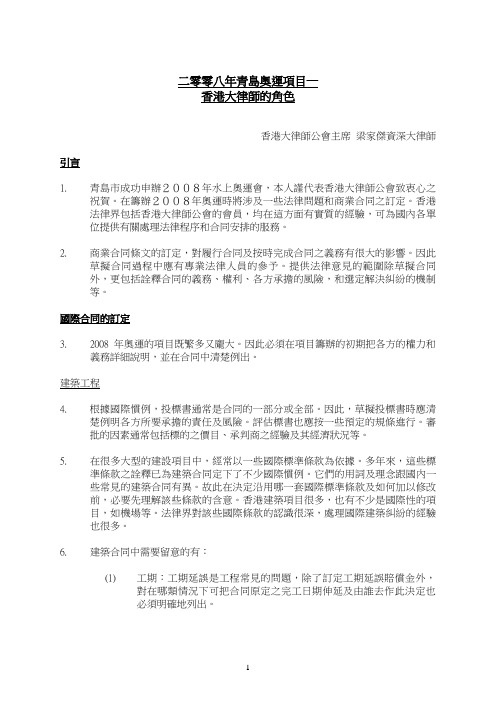
二零零八年青島奧運項目—香港大律師的角色香港大律師公會主席梁家傑資深大律師引言1. 青島市成功申辦2008年水上奧運會,本人謹代表香港大律師公會致衷心之祝賀。
在籌辦2008年奧運時將涉及一些法律問題和商業合同之訂定。
香港法律界包括香港大律師公會的會員,均在這方面有實質的經驗,可為國內各單位提供有關處理法律程序和合同安排的服務。
2. 商業合同條文的訂定,對履行合同及按時完成合同之義務有很大的影響。
因此草擬合同過程中應有專業法律人員的參予。
提供法律意見的範圍除草擬合同外,更包括詮釋合同的義務、權利、各方承擔的風險,和選定解決糾紛的機制等。
國際合同的訂定3.2008年奧運的項目既繁多又龐大。
因此必須在項目籌辦的初期把各方的權力和義務詳細說明,並在合同中清楚例出。
建築工程4. 根據國際慣例,投標書通常是合同的一部分或全部。
因此,草擬投標書時應清楚例明各方所要承擔的責任及風險。
評估標書也應按一些預定的規條進行。
審批的因素通常包括標的之價目、承判商之經驗及其經濟狀況等。
5.在很多大型的建設項目中,經常以一些國際標準條款為依據。
多年來,這些標準條款之詮釋已為建築合同定下了不少國際慣例。
它們的用詞及理念跟國內一些常見的建築合同有異。
故此在決定沿用哪一套國際標準條款及如何加以修改前,必要先理解該些條款的含意。
香港建築項目很多,也有不少是國際性的項目,如機場等。
法律界對該些國際條款的認識很深,處理國際建築糾紛的經驗也很多。
6.建築合同中需要留意的有:(1) 工期:工期延誤是工程常見的問題,除了訂定工期延誤賠償金外,對在哪類情況下可把合同原定之完工日期伸延及由誰去作此決定也必須明確地列出。
(2) 變更工程之增加:變更工程是在所難免的。
其影響通常是工程費上升及工期可能延誤。
合同條款可先作出安排,要求承判商將變更工程之影響盡早提出。
(3)分包商的管理:分包工程估計是奧運建設項目必然會出現的情況。
管理雖是承判商的責任,但主辦單位也須作出積極的參與,並在合同中列出一些有助管理之要求,如分包商之聘用必須先獲得主辦單位之同意,承判商須按期發放中期糧款予分包商等。
香港证券从业卷一模拟题-1
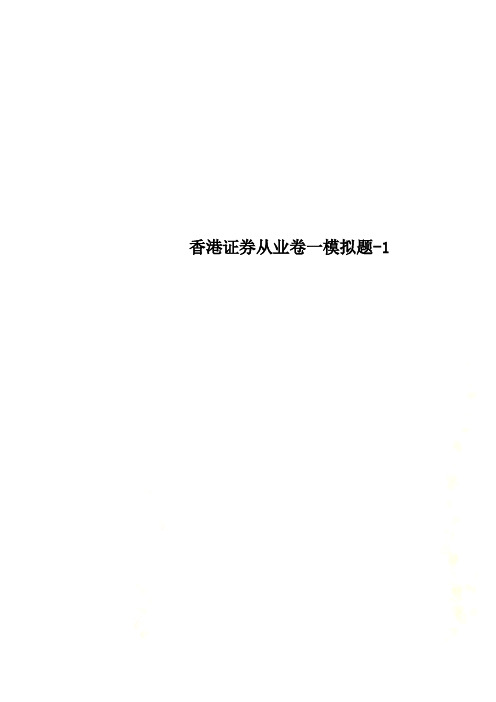
香港证券从业卷一模拟题-1卷11. 香港各金融监管机构致力防止:I. 洗黑钱活动II. 市场失当行为III.资金随便进出香港市场IV. 基金经理将资金在股票及外汇等投资之间转换。
A. II、III。
B. I、II。
C. I、II、IV。
D. I、III、IV。
2. 以下哪些描述可反映以监管机构评审结果为本制度的理念﹖I. 该制度关注于最高披露限制及提供有关公开发售的资料。
II. 由监管机构筛选出不受欢迎参与者及不受欢迎发售。
III. 股份发售须确保发起人与投资之间存在公平均势,或投资公众拥有风险与回报之间的公平均势。
IV. 本地监管机构的规管及评审标准较外地严格得多。
A. I、III。
B. II、III。
C. I、II、IV。
D. II、III、IV。
3. 以下各项中,哪些是正确的﹖I. 由金银业贸的成员发起的「纸黄金计划」由证监会负责授权。
II. 强积金管理局负责审批核准注册计划的受托人的事务。
III. 强积金管理局处理与强积金产品及核准受托人有关的投诉,必要时提交予证监会或其它监管机构以采取行动。
IV. 与投资有关的人寿保险由保险业监督认可。
A. I、III。
B. II、III。
C. I、II、III。
D. II、III、IV。
4. 《证券及期货条例》规定,就证券及期货合约而言,在任何情况下,如某人蓄意或罔顾后果地制造下述何种情况,则虚假交易即告发生﹖I. 设定非真实的价格。
II. 稳定价格。
III. 维持非真实的价格水平。
IV. 进行并无实益拥有权转变的虚售交易。
A. I、II、III。
B. II、III、IV。
C. I、III、IV。
D. I、II、III、IV。
5. 以下哪些与证监会有关的委员会的描述是正确的﹖I. 单位信委员会核准单位信托、互惠基金。
II. 股份登记机构纪律委员会初步聆讯及确定股份登记机构有关的纪律事项。
III. 投资者教育咨询委员会就设定投资者教育目标向证监会提供意见或支持。
香港《律政人员条例》
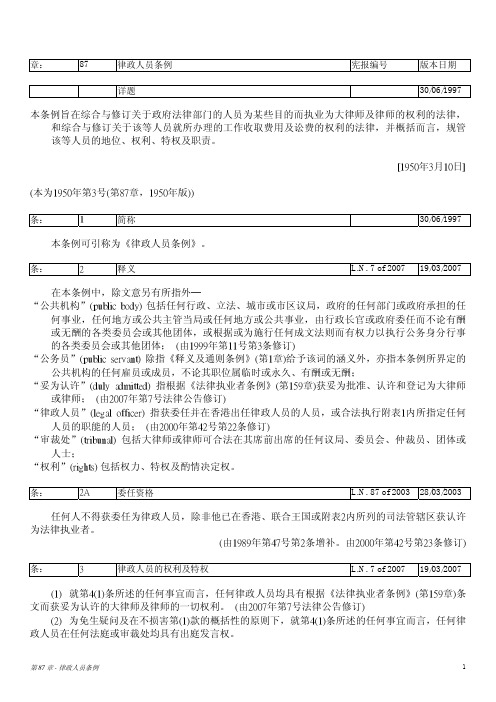
条:
6
律政司司长在根据《婚姻诉讼条例》进行的法律程序中的 11 of 1999 权利及职责
附注: 具追溯力的修订─见1999年第11号第3条
01/07/1997
在紧接1997年7月1日之前可由当时的律政司对于香港法庭根据或凭借《婚姻诉讼条例》(第179
第 87 章 - 律政人员条例
2
章)而具有司法管辖权的法律程序行使或履行的权利及职责,除抵触《基本法》者外,在该日或之后 均可由律政司司长行使或履行。
附表: 2
L.N. 87 of 2003 28/03/2003
[第2A条]
1. 澳大利亚联邦各州及领地。 2. 加拿大各领地及省,魁北克除外。 3. 新西兰。 4. 爱尔兰共和国。 5. 津巴布韦。 6. 新加坡。
(附表2由2000年第42号第27条增补)
第 87 章 - 律政人员条例
5
(2) 在任何情况下,如对任何事宜是否属第(1)款所述事宜有疑问,律政司司长就该问题签署的 证明书在各方面而言均为最后及最终定论。
(由1997年第362号法律公告修订)
条:
5
律政司司长的权利
附注: 具追溯力的修订─见1999年第11号第3条
11 of 1999
01/07/1997
在紧接1997年7月1日之前由当时的律政司在香港法庭享有的所有权利,除抵触《基本法》者 外,在该日或之后均可由律政司司长行使。
条:
11
行政长官修订附表1的权力
L.N. 87 of 2003 28/03/2003
行政长官可藉命令而以任何与不时施行的《拨款条例》相符的形式,修订附表1。 (由1999年第11号第3条修订;由2000年第42号第25条修订)
取得内地法律职业资格的香港特别行政区和澳门特别行政区居民在内地从事律师职业管理办法
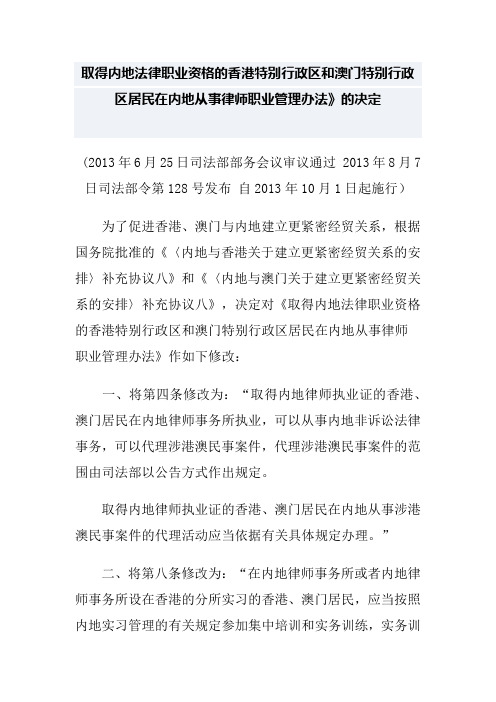
取得内地法律职业资格的香港特别行政区和澳门特别行政区居民在内地从事律师职业管理办法》的决定(2013年6月25日司法部部务会议审议通过 2013年8月7日司法部令第128号发布自2013年10月1日起施行)为了促进香港、澳门与内地建立更紧密经贸关系,根据国务院批准的《〈内地与香港关于建立更紧密经贸关系的安排〉补充协议八》和《〈内地与澳门关于建立更紧密经贸关系的安排〉补充协议八》,决定对《取得内地法律职业资格的香港特别行政区和澳门特别行政区居民在内地从事律师职业管理办法》作如下修改:一、将第四条修改为:“取得内地律师执业证的香港、澳门居民在内地律师事务所执业,可以从事内地非诉讼法律事务,可以代理涉港澳民事案件,代理涉港澳民事案件的范围由司法部以公告方式作出规定。
取得内地律师执业证的香港、澳门居民在内地从事涉港澳民事案件的代理活动应当依据有关具体规定办理。
”二、将第八条修改为:“在内地律师事务所或者内地律师事务所设在香港的分所实习的香港、澳门居民,应当按照内地实习管理的有关规定参加集中培训和实务训练,实务训练以办理非诉讼法律事务及代理有关涉港澳民事案件的训练为主,并遵守有关实习的规定和纪律。
接受香港、澳门居民实习的内地律师事务所或其分所,应当指派擅长办理非诉讼法律事务及代理涉港澳民事案件的律师指导实习人员进行实务训练。
每名指导律师只能指导一名香港或者澳门的实习人员。
”三、将第十五条修改为:“获准在内地执业的香港、澳门居民,可以采取担任法律顾问、代理、咨询、代书等方式从事内地非诉讼法律事务,也可以采取担任诉讼代理人的方式代理涉港澳民事案件,享有相应的律师权利,履行相应的律师义务。
”四、本决定自2013年10月1日起施行。
《取得内地法律职业资格的香港特别行政区和澳门特别行政区居民在内地从事律师职业管理办法》(司法部令第81号发布,司法部令第99号、第105号和第117号修正)根据本决定作相应修正,重新发布。
香港执业律师条例(香港律师法)
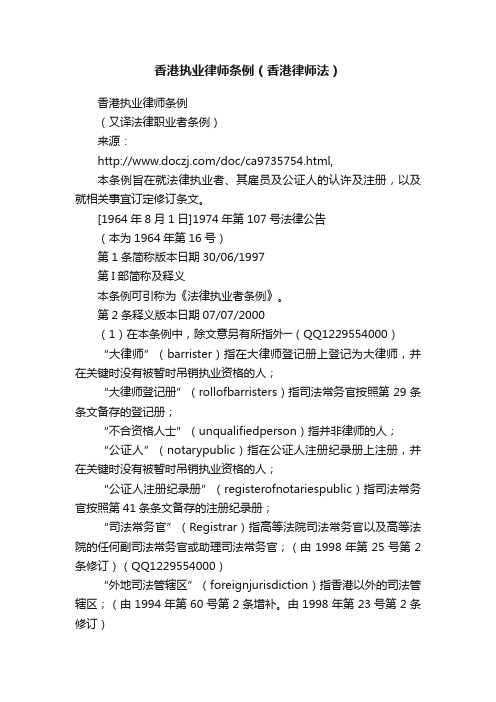
香港执业律师条例(香港律师法)香港执业律师条例(又译法律职业者条例)来源:/doc/ca9735754.html,本条例旨在就法律执业者、其雇员及公证人的认许及注册,以及就相关事宜订定修订条文。
[1964年8月1日]1974年第107号法律公告(本为1964年第16号)第1条简称版本日期30/06/1997第I部简称及释义本条例可引称为《法律执业者条例》。
第2条释义版本日期07/07/2000(1)在本条例中,除文意另有所指外─(QQ1229554000)“大律师”(barrister)指在大律师登记册上登记为大律师,并在关键时没有被暂时吊销执业资格的人;“大律师登记册”(rollofbarristers)指司法常务官按照第29条条文备存的登记册;“不合资格人士”(unqualifiedperson)指并非律师的人;“公证人”(notarypublic)指在公证人注册纪录册上注册,并在关键时没有被暂时吊销执业资格的人;“公证人注册纪录册”(registerofnotariespublic)指司法常务官按照第41条条文备存的注册纪录册;“司法常务官”(Registrar)指高等法院司法常务官以及高等法院的任何副司法常务官或助理司法常务官;(由1998年第25号第2条修订)(QQ1229554000)“外地司法管辖区”(foreignjurisdiction)指香港以外的司法管辖区;(由1994年第60号第2条增补。
由1998年第23号第2条修订)“外地法律”(foreignlaw)指外地司法管辖区的法律;(由1994年第60号第2条增补。
由1998年第23号第2条修订)“外地律师”(foreignlawyer)指根据第IIIA部注册为外地律师的人;(由1994年第60号第2条增补。
由1998年第23号第2条修订)“外地律师行”(foreignfirm)指根据第IIIA部注册为外地律师行的律师行或独营执业者;(由1994年第60号第2条增补。
香港执业律师条例(香港律师法)
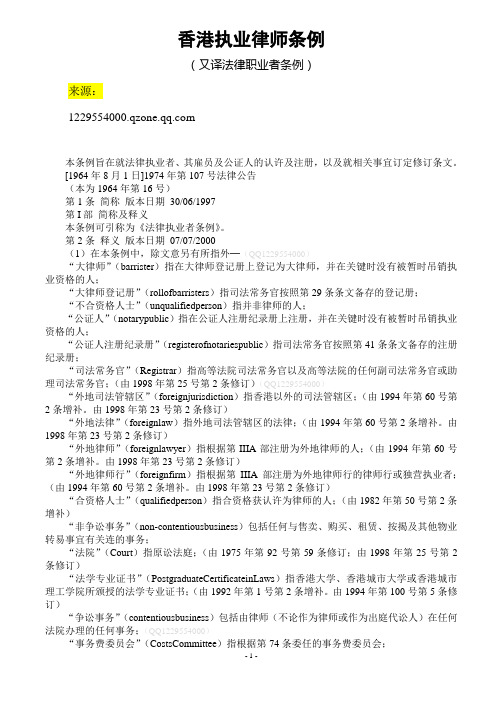
香港执业律师条例(又译法律职业者条例)来源:本条例旨在就法律执业者、其雇员及公证人的认许及注册,以及就相关事宜订定修订条文。
[1964年8月1日]1974年第107号法律公告(本为1964年第16号)第1条简称版本日期30/06/1997第I部简称及释义本条例可引称为《法律执业者条例》。
第2条释义版本日期07/07/2000(1)在本条例中,除文意另有所指外─(QQ1229554000)“大律师”(barrister)指在大律师登记册上登记为大律师,并在关键时没有被暂时吊销执业资格的人;“大律师登记册”(rollofbarristers)指司法常务官按照第29条条文备存的登记册;“不合资格人士”(unqualifiedperson)指并非律师的人;“公证人”(notarypublic)指在公证人注册纪录册上注册,并在关键时没有被暂时吊销执业资格的人;“公证人注册纪录册”(registerofnotariespublic)指司法常务官按照第41条条文备存的注册纪录册;“司法常务官”(Registrar)指高等法院司法常务官以及高等法院的任何副司法常务官或助理司法常务官;(由1998年第25号第2条修订)(QQ1229554000)“外地司法管辖区”(foreignjurisdiction)指香港以外的司法管辖区;(由1994年第60号第2条增补。
由1998年第23号第2条修订)“外地法律”(foreignlaw)指外地司法管辖区的法律;(由1994年第60号第2条增补。
由1998年第23号第2条修订)“外地律师”(foreignlawyer)指根据第IIIA部注册为外地律师的人;(由1994年第60号第2条增补。
由1998年第23号第2条修订)“外地律师行”(foreignfirm)指根据第IIIA部注册为外地律师行的律师行或独营执业者;(由1994年第60号第2条增补。
由1998年第23号第2条修订)“合资格人士”(qualifiedperson)指合资格获认许为律师的人;(由1982年第50号第2条增补)“非争讼事务”(non-contentiousbusiness)包括任何与售卖、购买、租赁、按揭及其他物业转易事宜有关连的事务;“法院”(Court)指原讼法庭;(由1975年第92号第59条修订;由1998年第25号第2条修订)“法学专业证书”(PostgraduateCertificateinLaws)指香港大学、香港城市大学或香港城市理工学院所颁授的法学专业证书;(由1992年第1号第2条增补。
香港、澳门特别行政区律师事务所驻内地代表机构管理办法(2015年)全文--国务院部委规章

香港、澳门特别行政区律师事务所驻内地代表机构管理办法(2015年)(2002年3月13日司法部令第70号发布。
根据2003年11月30日司法部令第84号、2006年12月22日司法部令第104号和2015年4月27日司法部令第131号修正)第一章总则第一条为规范香港、澳门特别行政区律师事务所(以下简称港澳律师事务所)驻内地代表机构(以下简称代表处)的设立及其法律服务活动,根据《外国律师事务所驻华代表机构管理条例》的规定,制定本办法。
第二条港澳律师事务所设立代表处,从事法律服务活动,适用本办法。
第三条代表处及其代表依照本办法规定从事法律服务活动,受国家法律保护。
第四条代表处及其代表从事法律服务活动,应当遵守国家法律、法规和规章,恪守律师职业道德和执业纪律,不得损害国家安全和社会公共利益。
第五条港澳律师事务所对其代表处及其代表在内地从事的法律服务活动承担民事责任。
第二章代表处的设立、变更和注销第六条港澳律师事务所在内地设立代表处、派驻代表,应当经省、自治区、直辖市司法厅(局)许可。
港澳律师事务所、其他组织或者个人不得以咨询公司或者其他名义在内地从事法律服务活动。
第七条港澳律师事务所申请在内地设立代表处、派驻代表,应当具备下列条件:(一)该律师事务所已在港、澳特别行政区合法执业,并且没有因违反律师职业道德、执业纪律受到处罚;(二)代表处的代表应当是执业律师和港、澳特别行政区律师协会会员,并且已在内地以外执业不少于2年,没有受过刑事处罚或者没有因违反职业道德、执业纪律受过处罚;其中,首席代表已在内地以外执业不少于3年,并且是该律师事务所的合伙人或者是相同职位的人员;(三)有在内地设立代表处开展法律服务业务的实际需要。
第八条港澳律师事务所申请在内地设立代表处,应当向拟设立的代表处住所地的省、自治区、直辖市司法厅(局)提交下列文件材料:(一)该律师事务所主要负责人签署的设立代表处、派驻代表的申请书。
拟设立的代表处的名称应当为“××律师事务所(该律师事务所的中文名称)驻××(内地城市名)代表处”;(二)该律师事务所在其本特别行政区已经合法设立的证明文件;(三)该律师事务所的合伙协议或者成立章程以及负责人、合伙人名单;(四)该律师事务所给代表处各拟任代表的授权书,以及拟任首席代表系该律师事务所合伙人或者相同职位人员的确认书;(五)代表处各拟任代表的律师执业资格以及拟任首席代表已在内地以外执业不少于3年、其他拟任代表已在内地以外执业不少于2年的证明文件;(六)该律师事务所所在特别行政区的律师协会出具的该代表处各拟任代表为本地区律师协会会员的证明文件;(七)该律师事务所所在特别行政区的律师管理机构出具的该律师事务所以及各拟任代表没有受过刑事处罚和没有因违反律师职业道德、执业纪律受过处罚的证明文件。
律师从业人员基本行为规范
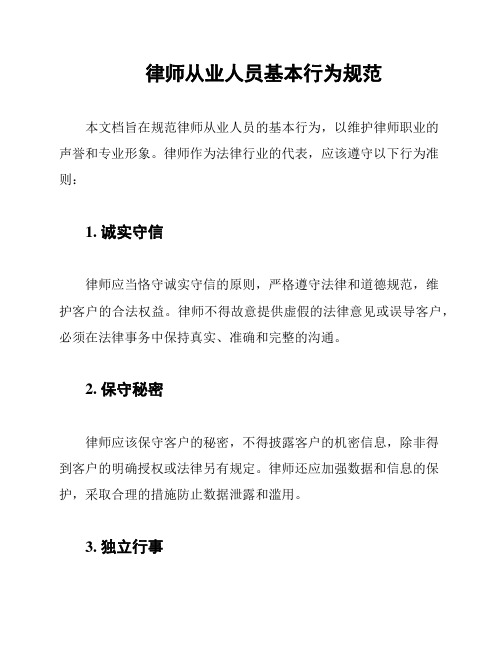
律师从业人员基本行为规范本文档旨在规范律师从业人员的基本行为,以维护律师职业的声誉和专业形象。
律师作为法律行业的代表,应该遵守以下行为准则:1. 诚实守信律师应当恪守诚实守信的原则,严格遵守法律和道德规范,维护客户的合法权益。
律师不得故意提供虚假的法律意见或误导客户,必须在法律事务中保持真实、准确和完整的沟通。
2. 保守秘密律师应该保守客户的秘密,不得披露客户的机密信息,除非得到客户的明确授权或法律另有规定。
律师还应加强数据和信息的保护,采取合理的措施防止数据泄露和滥用。
3. 独立行事律师应以独立的态度行事,维护自己的专业独立性,避免接受可能对其独立判断产生不当影响的利益,确保代理客户的决策独立和客观性。
4. 尊重职业道德律师应尊重职业道德,遵循律师职业守则和行为准则。
律师应充分理解自身在司法体系中的角色和责任,遵守法院的规则和程序,严守诚信原则,不得违反法律和职业道德规范。
5. 维护客户利益律师应当以客户的利益为重,忠实履行代理职责,为客户提供专业、高效和质量上乘的法律服务。
律师在处理案件时,应权衡利弊,确保客户在法律范围内获得最大的利益。
6. 尊重职业竞争律师应当遵守公平竞争的原则,不得采取不正当手段进行职业竞争。
律师之间应当互相尊重,不得进行诋毁、攻击或竞争恶意败坏他人声誉的行为。
7. 持续研究与自我提升律师应当积极参与持续研究,不断提高自身的法律知识和专业能力。
律师应关注法律法规的更新,及时研究新的法律理论和实务,提升自己在法律行业的竞争力。
以上行为规范是律师从业人员应当遵守的基本准则,通过坚守这些规范,律师能够更好地履行自己的职责,维护法律行业的良好形象和社会公正。
香港大律师公会专业守则
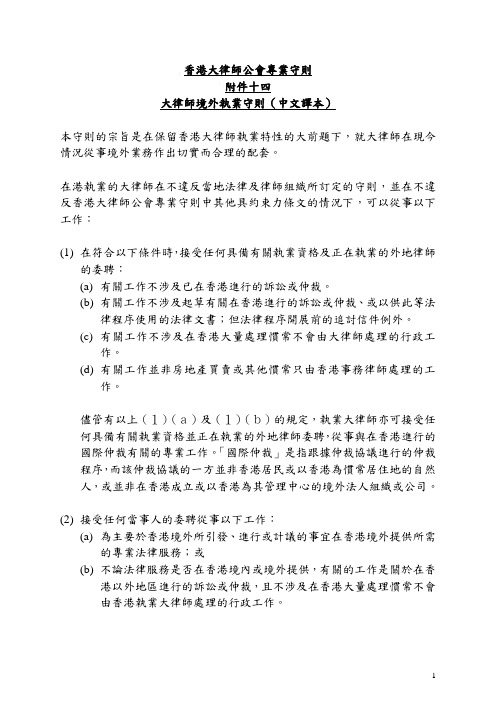
香港大律師公會專業守則附件十四大律師境外執業守則(中文譯本)本守則的宗旨是在保留香港大律師執業特性的大前題下,就大律師在現今情況從事境外業務作出切實而合理的配套。
在港執業的大律師在不違反當地法律及律師組織所訂定的守則,並在不違反香港大律師公會專業守則中其他具約束力條文的情況下,可以從事以下工作:(1)在符合以下條件時,接受任何具備有關執業資格及正在執業的外地律師的委聘:(a)有關工作不涉及已在香港進行的訴訟或仲裁。
(b)有關工作不涉及起草有關在香港進行的訴訟或仲裁、或以供此等法律程序使用的法律文書;但法律程序開展前的追討信件例外。
(c)有關工作不涉及在香港大量處理慣常不會由大律師處理的行政工作。
(d)有關工作並非房地產買賣或其他慣常只由香港事務律師處理的工作。
儘管有以上(1)(a)及(1)(b)的規定,執業大律師亦可接受任何具備有關執業資格並正在執業的外地律師委聘,從事與在香港進行的國際仲裁有關的專業工作。
「國際仲裁」是指跟據仲裁協議進行的仲裁程序,而該仲裁協議的一方並非香港居民或以香港為慣常居住地的自然人,或並非在香港成立或以香港為其管理中心的境外法人組織或公司。
(2)接受任何當事人的委聘從事以下工作:(a)為主要於香港境外所引發、進行或計議的事宜在香港境外提供所需的專業法律服務;或(b)不論法律服務是否在香港境內或境外提供,有關的工作是關於在香港以外地區進行的訴訟或仲裁,且不涉及在香港大量處理慣常不會由香港執業大律師處理的行政工作。
(3)在符合以下條件的情況下,可接受在香港境外從事業務或慣常在香港境外居住的當事人或在香港境外執業的律師的委聘:(a)該委聘來自香港境外。
(b)該委聘不涉及大律師先前已通過在香港執業的事務律師所委托的事宜。
(c)有關工作不涉及已經在香港進行的訴訟或仲裁。
(d)有關工作不涉及起草有關在香港進行的訴訟或仲裁、或以供此等法律程序使用的法律文書;但法律程序開展前的追討信件例外。
【视野】中国香港社会工作专业伦理守则解析(下)

【视野】中国香港社会工作专业伦理守则解析(下)相较于中国内陆和中国台湾省的社会工作守则,中国香港的伦理守则较为详尽,条目和文本字数较多,规范也较为细致。
《社会工作者工作守则》(以下简称《工作守则》)分为两部分54 条,3900 余字,《社会工作者工作守则实务指引》(以下简称《实务指引》)着重解释实务原则,共计8200 余字。
归纳而言,中国香港社会工作伦理责任主要包括五大范畴:对案主、对同事、对实务机构、对专业及对社会全体的伦理责任。
对案主的伦理责任《工作守则》主要就社会工作者的职责、文化意识、知情决定与自决、使用资料与保密原则、利益冲突、性关系等专业关系,持续提供服务及收费措施等方面共计18 条,规范了社会工作者对案主的伦理责任。
《实务指引》就其中的1、4、6、7、8、11、12、13、14、16 条分别进行了进一步的阐述和详细说明。
《工作守则》明确规定,社会工作者的首要责任是要对案主负责,除非其他人的安全或其他权利受到侵害,否则必须将案主的权利放在首位。
这一规定,明确了生命健康原则是社会工作者处理伦理两难问题的优先考量原则,其中,生命健康既包括他人,又包含案主自身的生命健康。
《实务指引》进一步强调,社会工作者应在能力范围内,尽可能地为案主提供服务、满足其需求,如遇特殊情况出现价值观、利益冲突等或其他不可控因素而无法为案主提供所需服务时,社会工作者应避免为案主提供服务,或转介到其他同事或机构。
知情同意与案主自决是社会工作者处理伦理两难问题时的第二重要原则。
《工作守则》主要就三类案主的知情与自决给予规范:面对一般案主,社会工作者应给予其充分知情自决的权利;面对强制接受服务的案主,社会工作者应向案主说明其权利和权限,并协助案主获取最大自主权;面对自决权及自决能力受限的案主,社会工作者应鼓励案主尽可能更大范围地自主参与社会工作服务。
隐私与保密一直是社会工作者重视的伦理原则。
《工作守则》有6条内容要求,在任何情况下(包括被要求公开资料、需要公开资料、同事间的工作交流、电子媒介传递信息等),社会工作者都应尽可能地实现对案主隐私的尊重和保密。
香港大律师工会对外籍律师申请香港执业的要求
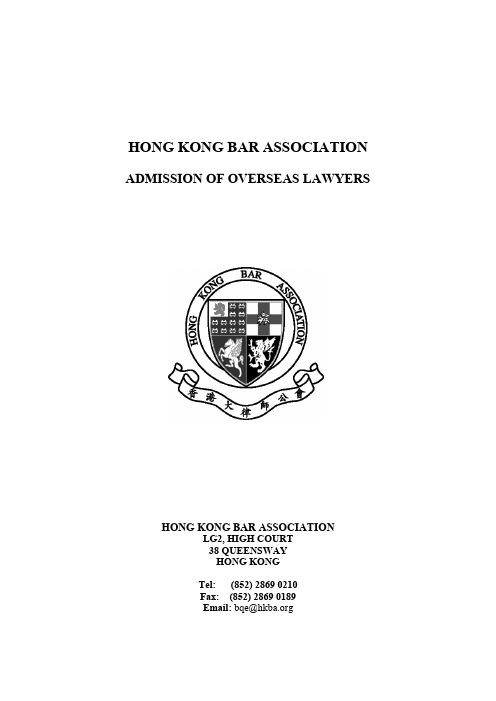
HONG KONG BAR ASSOCIATION ADMISSION OF OVERSEAS LAWYERSHONG KONG BAR ASSOCIATIONLG2, HIGH COURT38 QUEENSWAYHONG KONGTel: (852) 2869 0210Fax: (852) 2869 0189Email: bqe@I. INFORMATIONPACKAGE 2010CONTENTS PAGEI. INFORMATION PACKAGE1. Introduction (1)2. Overseas Lawyers (1)3. Requirements for Admission to the Hong Kong Bar (1)4. What is the Barristers Qualification Examination? (2)5. Frequency and Venue of the Barristers Qualification Examination (2)6. Deadlines (2)7. Application to sit the Barristers Qualification Examination (3)8. Certificate of Eligibility for Admission (3)9. Application for Exemption (4)10 The Application Form (4)11. Payment of Fees (5)12. Withdrawal from sitting the Examination (5)13. Examination Papers (6)14. Examination Procedure (6)15. Pass Requirements (6)16. Disqualification (6)17. Plagiarism (7)18. Examination Standard (7)19. Proficiency in the English Language (7)20. Preparation for the Barristers Qualification Examination (7)21. Use of the High Court Library (7)22. Examination Materials (7)23. Marking Procedure s (8)24. Examination Results (8)25. Applications to re-sit the Examination (8)26. Application for review of the Bar Council‟s decision (9)27. Examination Supplement (9)Annex A Schedule 1 to the Barristers (Qualification for Admission and Pupillage) RulesAnnex B Application Form for the Barristers Qualification ExaminationAnnex C Common Law JurisdictionsI. INFORMATION PACKAGE1.IntroductionThis Information Package explains how lawyers who have qualified otherwise than in accordance with section 27(1) of the Legal Practitioners Ordinance (Cap. 159) (“LPO”) can be called to the Hong Kong Bar. This applies to all overseas lawyers whether from common-law or non-common law jurisdictions.2.Overseas LawyersAn “overseas lawyer” is defined in section 2 of the Barristers (Qualification for Admission and Pupillage) Rules (“B(QAP)R”)as …a person who is entitled to practise the law of a foreign jurisdiction’.3.Requirements for Admission to the Hong Kong BarIn order to practise at the Hong Kong Bar, a person must first be admitted by the Court as a barrister of the High Court in Hong Kong. The power of the Court to admit barristers is governed by section 27 of the LPO, (as amended by the Legal Practitioners (Amendment) Ordinance 2000), and the Barristers (Qualification for Admission and Pupillage) Rules, which particularises the qualifications required for admission as a barrister under section 27 LPO.Section 4 of the B(QAP)R sets out the requirements for admission to the Bar.According to section 4(1), there are three criteria under which a person is qualified for admission as a barrister under section 27(1) LPO.These are that the person:(a)has obtained a Postgraduate Certificate in Laws; or(b)has been admitted as a solicitor in Hong Kong for at least 3 yearseither immediately or in any case not more than 12 months beforethe date of his application for admission and during that time hewas in practice as a solicitor in Hong Kong or employed in thepublic service of the Government as a legal officer within themeaning of the Legal Officers Ordinance (Cap. 87); or(c)is an overseas lawyer who satisfies the requirements specified insubsection (2).An overseas lawyer is therefore qualified for admission as a barrister under section 27(1) LPO if he satisfies the requirements set out in section 4(2) that he:(a)holds a certificate of admission as a legal practitioner from theappropriate authority in his jurisdiction of admission and suchcertificate is valid and currently in force;(b)has practised for at least 3 years in his jurisdiction of admission;(c)is a person of good standing in his jurisdiction of admission; and(d)has passed the Examination (excluding any examination paperwhich such person has been exempted from sitting pursuant tosubsections (4) and (5)).Normally, both Hong Kong and overseas lawyers will have to complete at least 6 months of the required period of approved pupillage before admission to the Bar. In exceptional circumstances, however, there is provision for a reduction in the period of approved pupillage in section 16 of the B(QAP)R.4.What is the Barristers Qualification Examination (“The Examination”)?The Examination will qualify overseas lawyers for pupillage and eventual practice at the Hong Kong Bar. It will be held once a year and will consist of five Papers based on the list of subjects in section 5(2) of the B(QAP)R.All five Papers are compulsory unless an applicant has obtained an exemption1 from sitting one or more of the Papers.The language for both written and oral papers will be English. More details on the Examination can be found in the Examination Supplement.5.Frequency and Venue of the Barristers Qualification ExaminationThe Examination will be held once every year and information will be provided as to dates and venue as soon as practicable. The next Examination will be held in late October 2010.6.Deadlines3rd May 2010Application for Certificate of Eligibility for Admissionif a person wishes to sit the Examination in October2010.5th July 2010 Application to sit the Examination.1see paragraph 9 below7.Application to sit the Barristers Qualification ExaminationTo apply to sit the Examination, an applicant should submit the following:1.an Application Form to sit the Examination (Annex B);2. a Certificate of Eligibility for Admission; and3.the non-refundable fee prescribed in Schedule 1 to the B(QAP)R,to the Bar Secretariat, Hong Kong Bar Association, LG2, High Court, 38 Queensway, Hong Kong by the registration dates specified above.8.Certificate of Eligibility for AdmissionAn overseas lawyer must first apply to the Bar Council for a Certificate of Eligibility for Admission. The Bar Council shall issue the Certificate of Eligibility for Admission upon being satisfied that the overseas lawyer has complied with section 6 and Form 1 of the B(QAP)R, and upon payment of a non-refundable fee as prescribed in Schedule 1 to the B(QAP)R.The closing date for receipt of applications for a Certificate of Eligibility is Monday 3rd May 2010.A Certificate of Eligibility for Admission is valid for 12 months from it‟s dateof issue, unless the Bar Council otherwise determines. Under sections 6(6)-(7) of the B(QAP)R, a person may apply to the Bar Council in writing for an extension of the validity period of the Certificate upon payment of the non-refundable fee of HK$250. An application for extension of the validity of a Certificate of Eligibility for Admission must be made not later than 2 months before the expiry of the Certificate. Also see paragraph 12 below. 9.Application for ExemptionForm 1 at Schedule 2 to the B(QAP)R makes specific provision for persons applying for a Certificate of Eligibility for Admission to declare whether or not they wish to apply to be exempted from one or more Papers in the Examination.A person whose jurisdiction of admission is a common law one will beexempted from Paper I, unless the Bar Council determines otherwise in a particular case.Applicants from common law jurisdictions of admission who wish to be exempted from papers other than Paper I, or applicants from non-common law jurisdictions who wish to be exempted from sitting any Examination Papers,may apply for exemption when submitting their application for a Certificate of Eligibility for Admission.Form 1in Schedule 2 of the B(QAP)R requires such applicants to support their applications for exemption with documentary evidence. It is strongly recommended that applicants for exemption provide the Bar Association, amongst other things, with transcripts of all academic and professional qualifications on which they seek to rely in support of their application.Applicants are advised that in the event there is any doubt over the status or genuineness of documentary evidence which they present, the Bar Association may require such documentary evidence to be verified or accredited at the applicant‟s own expense, either by the Hong Kong Council for Academic Accreditation or other relevant organisation.Annex C provides a list of recognised common law jurisdictions. This is not necessarily exhaustive, but if a question arises as to whether a jurisdiction of admission in relation to an overseas lawyer is a common-law jurisdiction, the onus will be on the overseas lawyer to establish that his jurisdiction of admission2is a jurisdiction in which the law is substantially based on the common law3.Any exemptions granted by the Bar Council to an applicant will be stated on the Certificate of Eligibility issued to him. Partial exemptions will NOT be granted.10.The Application Form to sit the ExaminationThe Application Form to sit the Examination can be found at Annex B. This should be submitted to the Bar Council, together with all the necessary documentation stated in the form, once a Certificate of Eligibility for Admission has been obtained. Applicants will be informed of the result of their application as soon as practicable.Please note that the Application Form to sit the Examination should be accompanied by the appropriate fee prescribed in Schedule 1 to the B(QAP)R, (which depends on the number of Papers to be taken)The closing date for registration to sit the Examination in 2010 is Monday 5th July 2010.2 the foreign jurisdiction the law of which the overseas lawyer is entitled to practise: s.2, B(QAP)R3 common law jurisdiction as defined in s.2, B(QAP)R11.Payment of FeesPayment of the requisite fees must be made in Hong Kong Dollars by cheque payable to “Hong Kong Bar Association” or by telegraphic transfer to the following account of the Hong Kong Bar Association:Account Name - Hong Kong Bar AssociationBank –HSBCBank Code –004Account No. - 808-2-000020Swift Code - HSBCHKHHHKHAddress - 1 Queen‟s Road Central, Hong KongIf payment is made by telegraphic transfer, the Hong Kong Bar Association must be notified in advance. Please note that all bank charges for the telegraphic transfer shall be borne by the applicant.12.Withdrawal from sitting the Examination(a) After the issuance of a Certificate of Eligibility for Admission, butbefore registration to sit the Examination, any applicant who findsthat he/she is unable to take the Examination in 2010, may apply inwriting for an extension of the validity of the Certificate. However,he/she will be required to demonstrate good reason as to why he/shewas unable to sit the examination.An applicant must have a valid Certificate of Eligibility for Admissionto apply to sit the Examination. If an extension to the Certificate isnecessary but has not been applied for, an applicant will be required tosubmit a fresh application for a Certificate of Eligibility for Admission.(b) After the issuance of a Certificate of Eligibility for Admission andregistration to sit the Examination, an applicant who finds that he/sheis unable to take the Examination in 2010, may make a writtenapplication no later than 2 months prior to the start of the Examinationto withdraw, specifying the reasons therefor.A candidate may only apply for withdrawal from sitting all papers ofthe Examination which he/she is required to sit. Withdrawal fromsitting selective papers is not allowed.If a candidate intends to take the next sitting of the Examination,he/she must apply in accordance with paragraph 8 above, for anextension of the validity period of the Certificate of Eligibility forAdmission, to enable him/her to take the next sitting.(c) Application FeesIt is the general policy of the Hong Kong Bar Association that all feespaid in relation to the Barristers Qualification Examination areNON-REFUNDABLE.However, the Hong Kong Bar Association may in exceptional andappropriate cases and in its absolute discretion, allow a refund of theapplication fee after deduction of an administration fee determined bythe Bar Council.If a candidate wishes to apply for a refund of the application fee to sitthe Examination, he/she must do so at the time of application forwithdrawal, stating the circumstances of his/her case and the specificreasons in support of the application for refund.13.Examination PapersThe Examination shall consist of five Papers known as Papers I, II, III, IV and V4. Further information on the examination procedures and contents of each paper can be found in the Examination Supplement.Papers I to IV will be tested by way of a written examination and Paper V will be partly written and partly oral.14.Examination ProcedureCandidates are expected to comply with any instructions in respect of the Examination, which are published by the Bar Council from time to time.15.Pass RequirementsSubject to paragraph 25 below, all five Papers must be passed at the same sitting. A candidate who has been granted an exemption in one or more of the Papers is required to sit and pass those papers he has not been exempted from.16.DisqualificationThe Bar Council may disqualify any candidate whom it considers has committed an act of misconduct in relation to the Examination.4 s.5, B(QAP)R17.PlagiarismThe Hong Kong Bar Association takes a very serious view on plagiarism.Thus, whilst all of the Examination Papers are open-book, plagiarism will not be tolerated.Any candidate who plagiarises in any Paper of the Examination shall be disqualified from the 2010 Examination by the Bar Council.The Hong Kong Bar Association may take further action against a candidate who plagiarises in the Examination, including (without limitation) possibly by way of refusing any further attempt by that candidate at taking the Examination.18.Examination StandardThe standard expected is that of a competent junior barrister.19.Proficiency in the English LanguageA candidate who fails to show proficiency in English is unlikely to pass theExamination.20.Preparation for the Barristers Qualification ExaminationThe Hong Kong Bar Association is currently not providing study courses for the Papers. Candidates are expected to prepare for the Examination by way of self study and research, using as guidance, the syllabus and reading list for each subject contained in the Examination Supplement, and bearing in mind the expected standards in relation to each paper.e of the High Court LibraryThe Bar Association has arranged for candidates for the 2010 Examination to be granted permission to use the High Court Library located at LG4 of the High Court, 38 Queensway, Hong Kong.Candidates should identify themselves to the library staff on arrival by showing them their Letter of Registration.22.Examination MaterialsThe Examination is conducted on an open book basis. Candidates are permitted to bring into the Examination any book, document, or other written material.However, computers, mobile telephone, pagers, personal digital assistants, and other electronic devices which may be programmed, cannot be brought into the Examination.23.Marking ProceduresAll written Papers will be marked anonymously. Each script will be marked by a first examiner. Every script for which the first examiner has given a mark below 50 or a mark above 65 and a representative selection of other papers will be marked by a second examiner.The Chief Examiner will review all scripts for each Paper to ensure consistency in marking amongst examiners of the same Paper and will review and make a determination on the final mark for each script:(1)Given a mark of 50 or less; and(2)Where the examiners were unable to agree upon a final mark.24.Examination ResultsEvery effort will be made to have the Examination papers marked and candidates informed of their Examination results as soon as possible.25.Applications to re-sit the ExaminationIn order to pass the Examination a candidate must pass all five papers in one sitting or, where any exemptions have been granted, all those papers the candidate has not been exempted from.A candidate who fails three or more papers will be deemed to have failed theExamination, and will be required to re-sit the entire Examination.A candidate who fails not more than two papers in any one sitting,will notbe required to re-sit the entire Examination but will be allowed to re-sit just those papers he has failed.A candidate must pass the Examination, including any papers which he hasfailed and subsequently re-taken, but excluding any papers he has been exempted from sitting, within a period of three years. Should he fail to do this, he will be required to re-sit the entire Examination.To re-sit the Examination, candidates are required to submit: a valid Certificate of Eligibility for Admission, a copy of their Certificate(s) of Good Standing from their jurisdiction(s) of admission valid for the year 2010, together with the relevant fees.26.Applications for review of the Bar Council’s decisionSection 18 of the B(QAP)R provides that an applicant who is aggrieved by a decision of the Bar Council under the B(QAP)R, may, within one month of the date of the decision and upon payment of the fee prescribed in Schedule 1 to the B(QAP)R, apply in writing for the decision to be reviewed by the Bar Council.An applicant may further appeal to the Court of Appeal against the Bar Council‟s decision on review, within one month of the date of that decision. 27.Examination SupplementThe Examination Supplement will provide information on:- procedures for each examination;-the standards the candidate is expected to meet in the Examination;-the syllabus for each subject;- a recommended reading list for each subject;-recommended materials to bring into the examination; and-specimen and past examination papers for each subject.ANNEX BAPPLICATION TO SIT THE BARRISTERS QUALIFICATION EXAMINATIONIN CALENDAR YEAR 2010To: The Council of the Hong Kong Bar Association1.I, ………………………………………………………. of …………………....[full name in English and, if applicable Chinese]………………………………………………………………………………...[current residential address]the holder of a valid Certificate of Eligibility for Admission dated …………,[date] hereby apply to sit the following papers of the BarristersQualification Ex amination in calendar year …………:-[year]Paper* Subjects coveredPaper I: Contract; Tort.Paper II: Property Law (including Real and Personal Property);Conveyancing; Equity (including the Law of Trusts).Paper III: Criminal Law; Criminal Procedure; Criminal Evidence.Paper IV: Hong Kong Legal System; Constitutional and AdministrativeLaw; Company Law.Paper V: Civil Procedure; Civil Evidence; Professional Conduct;Advocacy.(* Delete whichever is inapplicable)2.I have been exempted from sitting the following paper(s) of the BarristersQualification Examination:-…………………………………………………………………………..…………………………………………………………………………………..…………………………….……………………………………………………………………..[list the paper(s) for which exemption has been granted.]3.I have previously sat the Barristers Qualification Examination. The date(s)on which I sat the Examination and Paper(s) (if any) which I passed on such sitting are as follows:-…………………………………………………………………………………..…………………………………………………………………………………..…………………………………………………………………………………..[list all relevant date(s) and paper(s) (if any) passed on each such sitting.]4. A copy of my Certificate of Eligibility for Admission is attached to thisapplication.5.Schedule 1 of the Barristers (Qualification for Admission and Pupillage) Rulesprescribes a fee of HK$2,000 for each examination paper which I am applying to sit. As I propose to sit a total of ………[number] examination papers, I also attach to this application a crossed cheque made payable to the Hong Kong Bar Association for the amount of ____________ [HK$ amount], being HK$2,000 times the number of papers for which I am applying to sit.Dated this ………. day of …………….20……(Sgd.)…………………………..Applicant‟s nameNote: The fees prescribed in Schedule 1 of the Barristers (Qualification for Admission andPupillage) Rules must be paid at the time of submission of this application.ANNEX CLIST OF COMMON LAW JURISDICTIONSAustralian States and territoriesBahamasBermudaCanadian provinces (except Quebec)England and WalesFijiIndiaJamaicaKenyaMalaysiaNew ZealandNorthern IrelandPakistanRepublic of IrelandScotlandSingaporeRepublic of South AfricaUnited States of America (except Louisiana)Zimbabwe。
管理办法对律师执业守则的要求

管理办法对律师执业守则的要求引言:律师执业守则是律师行业经营的基本准则,旨在规范律师的职业行为和工作规范,以保障律师的执业活动合法、公正、诚信。
而管理办法作为律师执业的监管工具,对律师执业守则制定了一系列要求,有助于确保律师行业的健康发展。
本文将探讨管理办法对律师执业守则的要求。
一、规范律师的职业道德管理办法要求律师要恪守执业道德,保持良好的职业操守。
律师应当恪守职业道德底线,始终以客户利益为优先考虑,忠实履行执业守则规定的职责。
在办理案件过程中,律师要坚持公正、客观的原则,不得违法且不得有失公正。
管理办法为律师行为设定了明确的底线,对于违反职业道德规范的律师将依法进行严肃处理。
二、维护律师的执业独立性管理办法要求律师应当保持独立的从业地位,不受任何组织或个人的干扰和控制。
律师在履行职责时应当始终保持客观中立、独立自主的态度,不受外界影响,独立行使辩护和代理权利。
同时,管理办法还明确规定了律师在执行职务过程中保密的义务,要求律师对于客户提供的相关信息和案情要严密保密,确保执业过程中的隐私和秘密。
三、推进律师事务的规范运作管理办法对律师事务所的组织结构、管理制度和人员管理等方面提出了明确要求,以促进律师事务的规范运作。
律师事务所应当建立健全的内部管理机构,确保律师行业的良好秩序。
同时,管理办法还规定了律师事务所应当进行年度审计和报告,加强对律师事务所的监督和管理,以确保律师事务所合规经营。
四、加强律师行业的职业培训管理办法强调了对律师的职业培训和教育的重要性,要求律师要不断提高自身素质和专业能力。
律师应当参加律师行业的职业培训和继续教育,不断提升自己的业务水平和道德修养。
管理办法还规定了对律师行业的考试和考核制度,以评估律师的专业水平和业务能力,推动律师行业的规范发展。
五、加强律师行业的社会责任管理办法强调了律师行业的社会责任,要求律师要积极参与公益事业,为社会做出贡献。
律师应当履行法律援助义务,为无力支付律师费的当事人提供法律援助;同时,律师还应当积极参与法律法规的研究和修改工作,为立法提供专业意见和建议,为社会的法治建设贡献力量。
- 1、下载文档前请自行甄别文档内容的完整性,平台不提供额外的编辑、内容补充、找答案等附加服务。
- 2、"仅部分预览"的文档,不可在线预览部分如存在完整性等问题,可反馈申请退款(可完整预览的文档不适用该条件!)。
- 3、如文档侵犯您的权益,请联系客服反馈,我们会尽快为您处理(人工客服工作时间:9:00-18:30)。
香港大律師公會專業守則
附件十四
大律師境外執業守則(中文譯本)
本守則的宗旨是在保留香港大律師執業特性的大前題下,就大律師在現今情況從事境外業務作出切實而合理的配套。
在港執業的大律師在不違反當地法律及律師組織所訂定的守則,並在不違反香港大律師公會專業守則中其他具約束力條文的情況下,可以從事以下工作:
(1)在符合以下條件時,接受任何具備有關執業資格及正在執業的外地律師
的委聘:
(a)有關工作不涉及已在香港進行的訴訟或仲裁。
(b)有關工作不涉及起草有關在香港進行的訴訟或仲裁、或以供此等法
律程序使用的法律文書;但法律程序開展前的追討信件例外。
(c)有關工作不涉及在香港大量處理慣常不會由大律師處理的行政工
作。
(d)有關工作並非房地產買賣或其他慣常只由香港事務律師處理的工
作。
儘管有以上(1)(a)及(1)(b)的規定,執業大律師亦可接受任何具備有關執業資格並正在執業的外地律師委聘,從事與在香港進行的國際仲裁有關的專業工作。
「國際仲裁」是指跟據仲裁協議進行的仲裁程序,而該仲裁協議的一方並非香港居民或以香港為慣常居住地的自然人,或並非在香港成立或以香港為其管理中心的境外法人組織或公司。
(2)接受任何當事人的委聘從事以下工作:
(a)為主要於香港境外所引發、進行或計議的事宜在香港境外提供所需
的專業法律服務;或
(b)不論法律服務是否在香港境內或境外提供,有關的工作是關於在香
港以外地區進行的訴訟或仲裁,且不涉及在香港大量處理慣常不會
由香港執業大律師處理的行政工作。
(3)在符合以下條件的情況下,可接受在香港境外從事業務或慣常在香港境
外居住的當事人或在香港境外執業的律師的委聘:
(a)該委聘來自香港境外。
(b)該委聘不涉及大律師先前已通過在香港執業的事務律師所委托的
事宜。
(c)有關工作不涉及已經在香港進行的訴訟或仲裁。
(d)有關工作不涉及起草有關在香港進行的訴訟或仲裁、或以供此等法
律程序使用的法律文書;但法律程序開展前的追討信件例外。
(e)有關工作不涉及在香港大量處理慣常不會由大律師處理的行政工
作。
(f)有關工作並非房地產買賣或其他慣常只由香港事務律師處理的工
作。
儘管有以上3(b),3(c)及3(d)的規定,執業大律
師可接受任何上述境外當事人或境外執業律師的委聘,從事與
在香港進行的國際仲裁有關的專業工作(國際仲裁的定義與上
文第(1)段相同)。
(4)就以上第(1)、(2)或(3)項中所提及的工作直接與有關律師或當
事人商討收費,並在有需要時採取行動追討欠款。
(5)除不能以僱員身份受聘外,大律師就以上第(1)、(2)或(3)項所
提及的工作,可選擇以按年收費、聘用定金、固定收費或視乎訴訟成敗而定的收費方式,並可自行酌情商議減收費用。
(6)除在香港執業的事務律師外,大律師可在香港境外執業時僱用任何人士
為其工作。
(7)在香港境外執業,並不一定需要聘用書記協助其處理業務。
(8)就以上第(1)、(2)或(3)項中所提及的工作及有關香港境外的法
律程序,資深大律師無論有沒有其他大律師的協助下也可起草有關的文書。
(9)出席香港境外的法院聆訊時,資深大律師可選擇自行出席或與另一位
大律師一同出席。
(10)除香港的執業事務律師或事務律師行以外,大律師在從事以上第(1)、
(2)或(3)項中提及的工作時,可與其他律師締結包括合伙人關係的任何合作關係,以之共用香港外的辦公室或服務或分享工作酬金。
(11)在香港境外以大律師或資深大律師的專銜作稱謂。
〔按,以上只為譯文,一切以英文原文作準。
〕。
